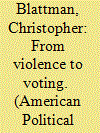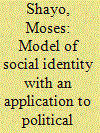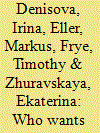|
|
|
Sort Order |
|
|
|
Items / Page
|
|
|
|
|
|
|
| Srl | Item |
| 1 |
ID:
090817


|
|
|
|
|
| Publication |
2009.
|
| Summary/Abstract |
One of the perennial puzzles of Montesquieu's The Spirit of the Laws is whether it has a coherent design. Although the dominant line of thinking is that this work has no unified structure, another believes it to have some organizing principle, even though proposals as to what it may be have failed to convince for lack of ability to account for various features of the work. I propose that The Spirit of the Laws is organized in a dialectical way, juxtaposing the antitheses of human freedom and determination. The tension between these is manifest in the first half of the work and resolved in the middle, and human freedom worked out and advanced in the second half. This article solves the long-standing question of the design of The Spirit of the Laws and reveals that the work's ultimate purpose is to champion human liberty over determination, contrary to the views of those who read the work as deterministic.
|
|
|
|
|
|
|
|
|
|
|
|
|
|
|
|
| 2 |
ID:
090807


|
|
|
|
|
| Publication |
2009.
|
| Summary/Abstract |
What is the political legacy of violent conflict? I present evidence for a link from past violence to increased political engagement among excombatants. The evidence comes from northern Uganda, where rebel recruitment generated quasiexperimental variation in who was conscripted by abduction. Survey data suggest that abduction leads to substantial increases in voting and community leadership, largely due to elevated levels of violence witnessed. Meanwhile, abduction and violence do not appear to affect nonpolitical participation. These patterns are not easily explained by conventional theories of participation, including mobilization by elites, differential costs, and altruistic preferences. Qualitative interviews suggest that violence may lead to personal growth and political activation, a possibility supported by psychological research on the positive effects of traumatic events. Although the generalizability of these results requires more evidence to judge, the findings challenge our understanding of political behavior and point to important new avenues of research.
|
|
|
|
|
|
|
|
|
|
|
|
|
|
|
|
| 3 |
ID:
090814


|
|
|
|
|
| Publication |
2009.
|
| Summary/Abstract |
Why have economic reforms aimed at reducing the role of the state been successful in some cases but not others? Are reform failures the consequence of leviathan states that hinder private economic activity, or of weak states unable to implement policies effectively and provide a supportive institutional environment? We explore these questions in a study of privatization in postcommunist Russia. Taking advantage of large regional variation in the size of public administrations, and employing a multilevel research design that controls for preprivatization selection in the estimation of regional privatization effects, we examine the relationship between state bureaucracy and the impact of privatization on firm productivity. We find that privatization is more effective in regions with relatively large bureaucracies. Our analysis suggests that this effect is driven by the impact of bureaucracy on the postprivatization business environment, with better institutional support and less corruption when bureaucracies are large.
|
|
|
|
|
|
|
|
|
|
|
|
|
|
|
|
| 4 |
ID:
090795


|
|
|
|
|
| Publication |
2009.
|
| Summary/Abstract |
This article develops a model for analyzing social identity and applies it to the political economy of income redistribution, focusing on class and national identities. The model attempts to distill major findings in social psychology into a parsimonious statement of what it means to identify with a group and what factors determine the groups with whom people identify. It then proposes an equilibrium concept where both identities and behavior are endogenously determined. Applying this model to redistribution helps explain three empirical patterns in modern democracies. First, national identification is more common among the poor than among the rich. Second, national identification tends to reduce support for redistribution. Third, across democracies there is a strong negative relationship between the prevalence of national identification and the level of redistribution. The model further points to national eminence, national threats, and diversity within the lower class as factors that can reduce redistribution.
|
|
|
|
|
|
|
|
|
|
|
|
|
|
|
|
| 5 |
ID:
090799


|
|
|
|
|
| Publication |
2009.
|
| Summary/Abstract |
We argue that large elections may exhibit a moral bias (i.e., conditional on the distribution of preferences within the electorate, alternatives understood by voters to be morally superior are more likely to win in large elections than in small ones).This bias can result from ethical expressive preferences, which include a payoff voters obtain from taking an action they believe to be ethical. In large elections, pivot probability is small, so expressive preferences become more important relative to material self-interest.
|
|
|
|
|
|
|
|
|
|
|
|
|
|
|
|
| 6 |
ID:
090805


|
|
|
|
|
| Publication |
2009.
|
| Summary/Abstract |
The trustee/delegate problem purportedly expresses how closely a representative's votes in the legislature should correspond to their constituents' preferences. In this article, I argue that the usual formulation of this debate collapses three distinctions-aims, source of judgment, and responsiveness-and thus obscures the underlying complexity of the phenomenon. Given its tripartite formulation, the collapse of these distinctions into a binary "trustee/delegate" formulation obscures a more complex political landscape with eight-rather than two-ideal types. Furthermore, once unpacked, we can see that the distinctions operate entirely independent of the location of authority, leading to the seemingly paradoxical instructed trustees and independent delegates. I also claim that the three distinctions apply to any decision maker, and thus, the attribution of this problem as distinctive of democratic political representation is an important overstatement. The article thus contributes to a more general theory of political representation that can be applied in nonelectoral and nondemocratic contexts increasingly relevant to global politics.
|
|
|
|
|
|
|
|
|
|
|
|
|
|
|
|
| 7 |
ID:
090810


|
|
|
|
|
| Publication |
2009.
|
| Summary/Abstract |
This paper focuses on powerful third parties whose interests in a conflict are closely aligned with a single disputant's interests. I show that such third-party bias reveals private information about an intervener's willingness to secure an agreement using force. When a highly biased power intervenes in a crisis, a peaceful settlement is likely because warring parties are certain the third party will enforce an agreement by military means. When an intervener shows less favoritism, negotiations tend to fail because the disputants doubt that it is committed to use force. Peace is again more likely when the third party is unbiased because such a party behaves as a mediator, seeking agreements both adversaries find acceptable. These findings, coupled with evidence from U.S. and British interventions in the Balkans, suggest a possible explanation for why major power intervention can bring about drastically different outcomes.
|
|
|
|
|
|
|
|
|
|
|
|
|
|
|
|
| 8 |
ID:
090802


|
|
|
|
|
| Publication |
2009.
|
| Summary/Abstract |
Theory on democracy and its consequences turns on how democracy influences behavior among politicians and the citizenry. Ultimately, the literature seeks to determine who benefits under democratic rules. This is our concern, posed in a context that allows us to address a classic question: does democracy favor large but diffuse segments of society over small but concentrated interests? We employ sectoral electricity consumption data for a panel of 733 country-years to examine democracy's impact on the distribution of electricity across three sectors that represent distinct political interests: industry, agriculture, and residential consumers. We find that in poorer countries democratization produces significant increases in the residential share of electricity relative to industry, suggesting sectors with less per capita financial clout, but a stronger voice in elections benefit under democracy. Unlike the large literatures on democracy's impact on the amounts of publicly provided goods, our results are among the first on the distribution of those goods.
|
|
|
|
|
|
|
|
|
|
|
|
|
|
|
|
| 9 |
ID:
090815


|
|
|
|
|
| Publication |
2009.
|
| Summary/Abstract |
Using survey data from 28 transition countries, we test for the complementarity and substitutability of market-relevant skills and institutions. We show that democracy and good governance complement market skills in transition economies. Under autocracy and weak governance institutions, there is no significant difference in support for revising privatization between high- and low-skilled respondents. As the level of democracy and the quality of governance increases, the difference in the level of support for revising privatization between the high and low skilled grows dramatically. This finding contributes to our understanding of microfoundations of the politics of economic reform.
|
|
|
|
|
|
|
|
|
|
|
|
|
|
|
|
|
|
|
|
|